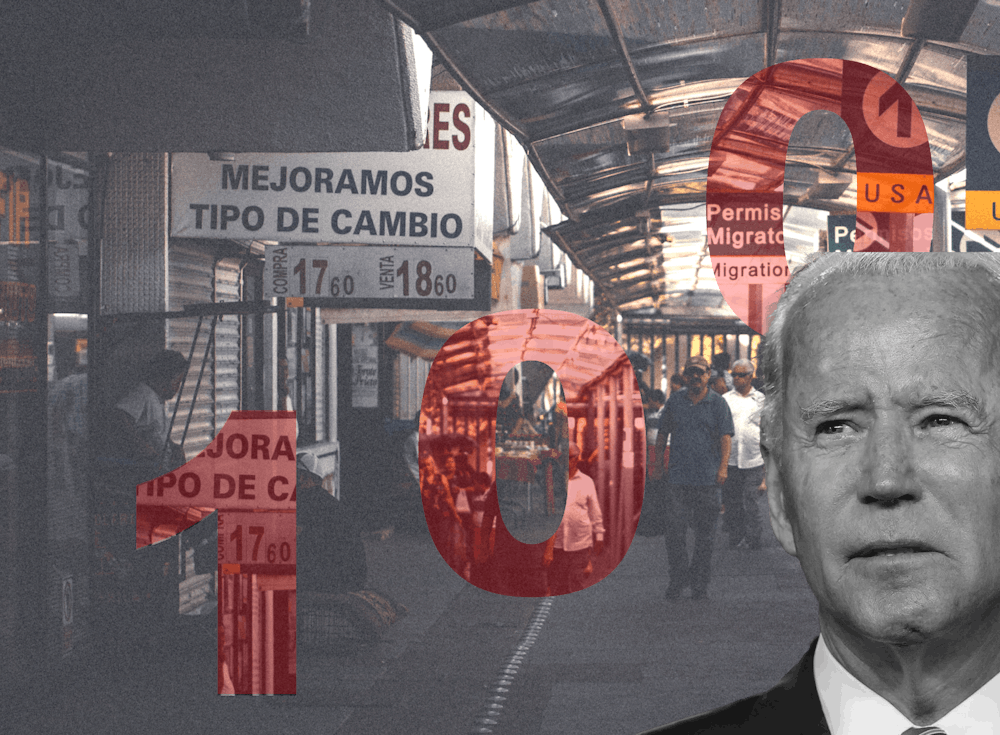Underrepresented communities proved to be an instrumental force in ensuring Joe Biden’s victory in the 2020 presidential election. BIPOC organizers and coalitions registered thousands of community members across the country and arrived at the polls in record numbers. President Biden isn't unaware of this reality either; after specifically acknowledging Black voters’ role in securing the election in his victory speech, he promised, “Especially those moments when this campaign was at its lowest end, the African American community stood up again for me. You always had my back, and I'll have yours.”
Now, mere months after taking office, President Biden has turned his back on the same communities that helped elect him. One of his key campaign promises was a 100–day moratorium on deportations in an attempt to reel back Trump’s heinous immigration policies. During a March 2020 primary debate, President Biden announced that, in the first 100 days of his administration, "no one will be deported at all. From that point on, the only deportations that will take place are commissions of felonies in the United States of America." But deportations have continued under Biden’s administration—and at record numbers.
According to United We Dream, a nationwide immigrant rights organization, an estimate of over 127,400 deportations have taken place so far under the Biden–Harris presidency. District Judge Drew Tipton issued a temporary 14–day block on the moratorium, but the ruling did not require the government to continue scheduling deportations. The hold also excludes the thousands of other deportations that have taken place under Title 42, a Trump–era policy used to close the border for nonessential travel and authorize the expulsion of non–citizens without procedural protections.
While the actions of the previous administration continue to have violent consequences for immigrants today, Biden's own record on immigration can't be ignored. The former Obama–Biden administration was responsible for nearly 3 million deportations, earning Obama the name of “deporter–in–chief.” Over the course of several presidencies, the United States has been an active participant in a long history of state violence against migrant communities, committing deportations, forced separations, mass incarceration, surveillance, and over–policing.

For many, President Biden’s continued deportations are devastating, but unfortunately, not surprising. Quyen Dinh, executive director of the Southeast Asia Resource Action Center, says, “This is a tragedy our community has to endure every single year.” On March 15, Immigration and Customs Enforcement (ICE) deported 33 Vietnamese immigrants and refugees, and thousands of other community members have received final orders of deportation or fear potential orders of removal.
During his presidential campaign, Biden promoted his previous congressional votes to increase funding for Vietnamese resettlement, while failing to acknowledge that many of these migrants were resettled into high–crime, under–resourced neighborhoods with little to no support from the government. Similarly, it's disturbing to witness Biden condemn the rise in anti–Asian violence, yet continue to deport Asian Americans at record numbers, separating families and perpetuating the prison–to–deportation pipeline that targets communities of color.
Alongside Trump's use of Title 42, waves of deportations under Biden have disproportionately affected Black, Latinx, and Asian immigrants. Sold as a public health issue, Title 42 has given U.S. border officials unchecked authority to expell thousands of immigrants without due process or access to asylum. According to Michele Heisler, a medical director at Physicians for Human Rights, Title 42 is an excuse to weaponize the pandemic against asylum seekers, rather than a genuine concern for public health. While COVID–19 is weaponized to justify more deportations, asylum–seekers currently stuck in detention centers sit in overcrowded facilities and fear exposure to coronavirus unless they abide by orders from ICE officials. In a year of Title 42, less than 1% of migrants at the U.S.–Mexico border have been able to seek protection. Lawyers, judges, and United Nations officials say the near impossibility of gaining asylum protection makes the policy illegal, and a violation of U.S. and international law.
Thousands of Haitian migrants in particular have faced deportation through the circumvention of proper legal proceedings and humanitarian protections under this policy. In a new report compiled by various immigrant rights groups, more Haitians have been removed in the first few weeks of the Biden–Harris administration than during all of Fiscal Year 2020.

In a recent Eyes on ICE National Forum, Haddy Gassama, an attorney at the UndocuBlack Network, shed light on the violence that marginalized communities faced during a time that was meant to honor them: “Biden deported Black people almost every single day during Black History Month ... [He] deported Black women almost every single day of Women's History Month, and he continues to deport people who are survivors of domestic violence as well as sexual assault.”
The deportations of Black refugees under the optics of a public health risk is antithetical to Biden’s own promises of supporting the Black community. As Gassama stresses, "[Biden’s] promises to improve the lives of Black people in the [United States] extends to the lives of Black immigrants.”
Many immigrant rights groups have put forth a variety of demands for Biden, including a blanket ban on deportations, policy reforms to decriminalize immigration, and a more stable pathway to citizenship. Ultimately, the onus is on Biden and his administration to uphold their promise to stop the inhumane deportations and removal of migrant communities.
However, activists and organizers remind us to go further: to question the “model or deserving immigrant” myth that underlies much of the United States’s immigration policy, to acknowledge the historic role of U.S. intervention in sparking global refugee crises, and to help build a world where it is understood that no human being is illegal.







